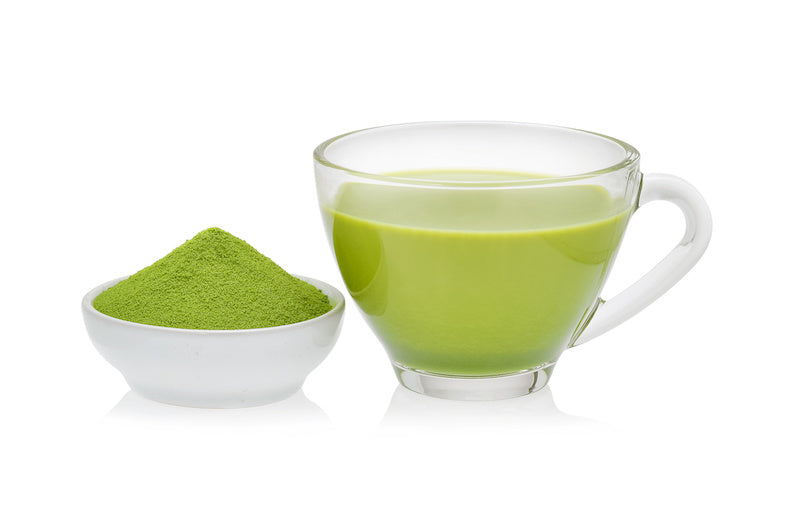Subscribe to Green Tea Podcast:
Green Tea for Digestion: Does it Help?
Green tea has been used in Japan for generations for many health purposes. One of the most important benefits of drinking green tea is that it improves digestion. In fact, as a digestive aid, green tea is one of the best all-natural ways to relieve and prevent common stomach issues! Let's talk more about green tea for digestion and some of the other benefits of this incredible beverage.
Did You Know? Drinking Green Tea Stimulates Your Digestive System
Green tea contains polyphenols that help improve your body’s digestive process. Simply put, drinking green tea regularly helps your body break food down more effectively.
Certain studies show that EGCG (the compound epigallocatechin gallate) works to reduce inflammation in the gastrointestinal tract. When drinking green tea, you gain access to more of the EGCG compound.
Read on for some of the more common stomach issues that green tea will help treat or prevent.
(Learn more about polyphenols, EGCG, and catechins in this post.)
1. Gassy? Get Rid of Flatulence with Green Tea
If you’re consistently plagued by gas or excessive flatulence, you likely have to avoid drinking or eating certain foods to ensure you don’t pass gas as frequently. While this symptom of excessive gas is particularly uncomfortable, it can also cause pain and discomfort.
Lucky for you, green tea has been proven to treat excessive gas. Next time you feel like you’re dealing with excessive gas, start making a pot of green tea. This will help you resolve your flatulence issues. Additionally, your bloating will decrease and help eliminate any pain you feel in your stomach.
(Want to learn more about the other health benefits of green tea? Read this post next.)

2. Suffer No More: Fight Inflammation and Treat IBD
IBD, or inflammatory bowel disease, can come about due to inflammation of the GI tract. In addition to drinking green tea for digestion, it can also be used to fight inflammation. This is an excellent way to treat any inflammation you may be feeling as a result of IBD.
Certain studies show that green tea helps reduce colon cancer in individuals who have been diagnosed with IBD. While you should speak with your doctor before beginning treatments for IBD, green tea is an excellent option to reduce any related inflammation you feel.
3. Believe it or Not, Green Tea Might Help Prevent Cancer
While multiple factors go into a cancer diagnosis, certain research shows that green tea can reduce one’s risk of developing stomach cancer. Though green tea is hardly a cure-all for cancer, drinking this beverage is a great way to take advantage of its polyphenols.
These polyphenols have been proven to prevent the growth of cancer cells. If you have a history of cancer in your family, be sure to speak with a medical professional to make sure you are doing all you can to prevent cancer.
4. Boost Your Heart Health with Green Tea
The act of drinking tea is quite calming in and of itself. But in addition to the positive meditative effects, green tea can dramatically boost your heart health. In fact, green tea has the potential to lower your blood cholesterol, and drinking this tea on a regular basis can help you burn off many harmful types of fat.
Instead of laying stagnant within your bloodstream, green tea helps your body eliminate these fats. Certain studies on heart disease prevention have proven that drinking four or more cups of tea on a regular basis can lower men’s likelihood of developing heart disease.

Boost Your Digestion Today By Drinking 2-3 Cups Of Green Tea
Now we know that green tea provides incredible benefits to a number of the body's systems. But when it comes to green tea for digestion, how much tea do you need to drink to see improvements?
Though green tea can positively affect your digestive system, if you drink it in excess, it can lead to undesirable effects. With two or three cups of green tea a day, you’ll absorb between 100 and 320 mg of polyphenols every day.
As you work to improve your digestive system, it is important to note that green tea contains caffeine. While the polyphenols can positively affect your body, the caffeine can negatively affect your digestive health.
Certain people who experience caffeine sensitivity tend to suffer from diarrhea, nausea, or an upset stomach. If you’re particularly sensitive to caffeine, you can try caffeine-free green tea. Without the added caffeine, this green tea option can still provide you with the same desired health benefits.
Moving Beyond Green Tea: Green Tea Can Improve Your Insulin Sensitivity
While green tea is certainly powerful, it can also help your body’s digestive system.
Green tea helps improve your body’s sensitivity to insulin. While the average person may relate insulin to diabetes, insulin sensitivity can affect anyone. Insulin is secreted by the pancreas and affects how the body uses glucose from the foods we eat. The body needs to break down carbs from foods and transform them into glucose. Insulin helps monitor how high or low your blood sugar gets.
With insulin sensitivity, an individual doesn't require as much insulin to lower their blood sugar. By using green tea, you can boost your body’s insulin sensitivity, making sure your blood sugar is better regulated.
There’s no time like the present to start taking advantage of the benefits of green tea. Keep this guide in mind as you start to work green tea into your diet and start boosting your digestive system and overall health!
If you're interested in shopping for the best green tea on the market, click here to see our best sellers!
Get Free Bonus Books

Sign up for free to the Green Tea Club to get advice and exclusive articles about how to choose Japanese Tea, and tips, tricks, and recipes for enjoying Japanese tea.
About the author
Kei Nishida
Author, CEO Dream of Japan
Certification: PMP, BS in Computer Science
Education: Western Washington University
Kei Nishida is a Japanese green tea enthusiast, a writer, and the founder and CEO of Japanese Green Tea Co., a Dream of Japan Company. His passion for introducing America to the tea of his homeland was the catalyst for creating the only company that brings high-quality tea from Arahataen Green Tea Farms to the rest of the world. Learn more about Kei























